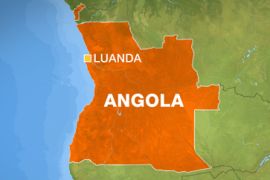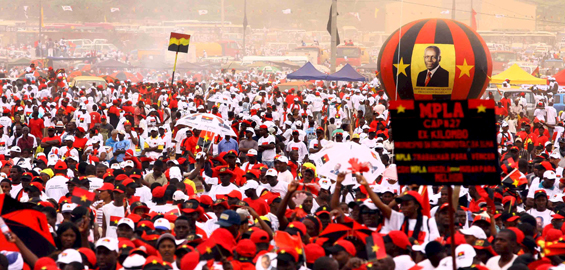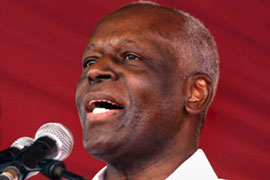Timeline: Angolan elections
Angola is holding its first parliamentary elections for 16 years.

 |
| The MPLA holds a campaign rally before the election [EPA] |
Angola is holding its first parliamentary elections in 16 years on September 5, 2008.
The elections are also the first to be held since a 27-year civil war ended in 2002.
The MPLA (Popular Movement for the Liberation of Angola) has ruled for more than 30 years, since Portugal, the former colonial power, withdrew its remaining forces.
Jose Eduardo dos Santos, the president, has led the MPLA since former leader Agostinho Neto died in 1979.
The MPLA’s main rival is Unita (National Union for the Total Independence of Angola), led by Isaias Samakuva. Unita is hoping to distance itself from its image as a former rebel movement and make political gains via the ballot box.
The MPLA, Unita and 12 other, smaller opposition parties are fielding about 5,000 candidates.
Angola now has one of the world’s fastest-growing economies. But while it is rich in natural resources and is one of Africa’s largest oil and diamond producers, about a quarter of its 17 million people live in extreme poverty.
The following are the key events in Angola over recent decades:
1975: Portugal withdraws its remaining forces following a period of 14 years known as the “Armed Struggle”. The Portuguese leave the MPLA in control of Luanda. Neto becomes Angola’s first president.
Following independence, a power struggle takes hold between the Soviet Union and Cuba-backed MPLA, which has its roots in the Angolan Communist party, and Unita and the FNLA (the National Front for the Liberation of Angola). For their parts, Unita and the FNLA are funded by several different countries over the years, including South Africa and the US.
1976: The MPLA routs the FNLA, and drives back Unita, forcing its supporting South African troops to withdraw, while some Cuban troops remain to fight on alongside the MPLA.
1979: Neto, the leader of the MPLA, dies and is replaced by Jose Eduardo dos Santos, who becomes Angola’s second president.
1987: South African forces enter Angola to assist Unita, which is under attack from an MPLA and Cuban offensive.
1988: An agreement is signed with South Africa and Cuba relating to withdrawal of all foreign troops, following which the South African army withdraws.
1989: Santos and Savimbi agree a ceasefire, but it collapses within a couple of months.
1991: The last Cuban troops leave Angola. Santos and Savimbi sign the Bicesse Accords peace deal in Lisbon, which provides for the end of a one-party state and the holding of multi-party elections and enactment of a new constitution. It also proposes an amnesty for political prisoners.
 |
| Jose Eduardo dos Santos addresses supporters [EPA] |
1992: The UN monitors multi-party elections for president and the national assembly. The MPLA wins both and, although the UN monitors certify the poll as generally free and fair, Unita accuses the government of electoral fraud. Savimbi, whose presidential bid has failed, rejects the results and fighting breaks out.
1993: The UN imposes an arms and petroleum embargo against Unita, which marks the first time such an embargo is imposed against a non-state party. A Security Council sanctions committee is established by the UN.
1994: The Angolan government and Unita sign the Lusaka Protocol in Zambia, which provides for a ceasefire followed by the demobilisation of Unita’s forces. Its members are to be disarmed and integrated into the country’s police force and army.
1998: Unita declares its effective demobilisation and Angola legalises the movement, but the government launches an offensive which lasts for four years.
2002: Amid fierce fighting in February southeast of Luena, the capital of Moxico province in Eastern Angola, Savimbi is killed in battle. Following his death, a ceasefire is signed in April. Forces are demobilised, Unita reorganises as a political party, and thousands of internally displaced people begin to head home.
In December of the same year, Santos appoints Fernando da Piedade Dias dos Santos as the prime minister.
2003: Isaias Samakuva is elected president of Unita, nearly three decades after joining.
2004: A survey published by Transparency International includes Angola in a list of oil-rich nations prone to corruption.
2004: Human rights group Coalition to Stop the Use of Child Soldiers releases a report condemning the use of child soldiers by governments in about a dozen countries, and also condemns the involvement of children in armed conflict in several more countries, including Angola.
2006: Angola overtakes Saudi Arabia as China’s largest oil supplier. Angola is one of many African countries benefiting from growing trade with China, which has cancelled debt, issued cheap credit and increased aid. Wen Jiabao, the Chinese premier, visits Angola in June and promises a new credit deal.
In August, the government signs a ceasefire with separatists in Cabinda. Sandwiched between Congo and DR Congo, Cabinda is a province to the north of Angola. The sliver of land produces 60 per cent of Angola’s oil.
In December, Angola joins Opec (Organisation of the Petroleum Exporting Countries).
February 2007: Santos says parliamentary elections will be held in 2008, and a presidential election the following year.
December 2007: Parliamentary elections are announced for 5 and 6 September 2008.
The same month, Angola is ranked second-most improved in the five categories ranked by the Ibrahim Index of African Governance. However, its overall ranking is 42 out of 48 countries. That assessment comes from a report published by the Mo Ibrahim Foundation. The issues rated include: safety and security; rule of law, transparency and corruption; participation and human rights; sustainable economic opportunity; and human development.
February 2008: Save the Children publishes a report on child mortality, noting that Angola’s child mortality rate, of 260 deaths per thousand, is 162 deaths higher than predicted for its economy’s size.
May 2008: More than eight million Angolans are registered to vote in the elections for the country’s 220-seat parliament.
August 2008: Oil industry experts are divided as to whether Angola has yet overtaken Nigeria as the African continent’s biggest oil producer. Differing estimates of production plus accounts of Nigeria’s figures being hit by kidnappings and unrest, mean that it is a close call.
August 2008: Parties begin campaigning for the legislative elections.
September 5, 2008: The MPLA is aiming to win a two-thirds majority that would allow it to make sweeping changes to the constitution.